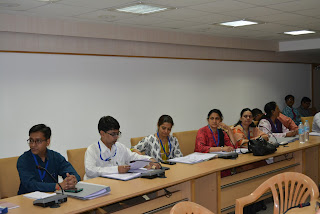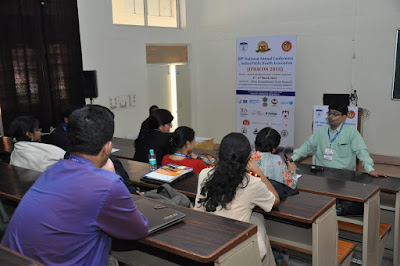IAOH Vadodara Branch organized regional conference namely GUJCON2016 at Surya Plave Hotel Vadodara. I am member of organizing committee and contributed one article in conference book.
The content of article is here
The content of article is here
Scope & Opportunities in
Occupational Health
Authors –
1.
Dr.
Niraj Pandit, Professor, Department of Community Medicine, SBKS MIRC, Sumandeep
Vidyapeeth, Piparia, Vadodara –Email – drniraj74@gmail.com
2.
Dr.
Bhavesh Bariya, Assistant Professor, Department of Community Medicine, SBKS
MIRC, Sumandeep Vidyapeeth, Piparia, Vadodara
Occupational
health (OH) is a discipline which deals
with all aspects of health and safety at the workplace and has strong focus on
prevention of hazards(1).
It is delivered by multiprofessional teams that include occupational health
physician, nurses, physiotherapists, ergonomists, psychologists and safety
professionals who are specially train in this area. In India occupational
health physicians are usually medical graduates with specialist like master in
community medicine or certificate course in industrial health or diploma course
in industrial health.(2)
The specialty requires a broad knowledge of medicine and other skills, which
includes understanding relevant government legislation relating to work;
ethics; excellent communication skills; and business development. Occupational health
physician is key person for the team of occupational Health Center. He/She must
have an understanding of epidemiology, disease prevention and toxicology. He/She
should be able to identify, assess the risk to health of, to know how to control, workplace hazards and
also know how to recognize, prevent and manage occupational disease. He/She can
guide and manage these risks and on their implications for employees’ health.
Courses
available in Occupational Health in Gujarat:
In India,
there are 21 institutes who are offering courses in the area of occupational
and environmental health. The courses are very from short duration training to
doctoral degree course like certificate course (Associate Fellow of Industrial
Health), Diploma in Industrial Health (DIH) and PhD in Occupational Health.(3) But
just limiting to Gujarat and Mumbai, the list of courses are given below -
Name of course
|
Institute
|
Duration
|
Eligibility
|
Web link
|
AFIH
|
IIPH, Gandhinagar
|
3 months
|
MBBS doctors with a minimum of one year experience in industry /
Occupational healthOR two years in any other field after internship
|
|
Diploma in Industrial Health
|
All India
institute of Hygiene and Public Health
MS University
Vadodara*
|
2 years
|
MBBS with
completed internship, Two year full time Post-graduate Diploma, Recognised by
Medical Council of India (MCI)
|
|
Certificate Course in Industrial
Health
|
M S University, Vadodara
|
6 months part time
|
Part time course which is
available for MBBS with completed internship with experience in industrial
health
|
|
AFIH
|
Central Labor Institute, Mumbai
|
3 months
|
MBBS with registration with
council and minimum 1 year experience in industry or relevant field
|
|
PhD in Occupational health
|
NIOH, AHmedabad
|
3 years fulltime
|
MD degree
|
* Due to
some administrative issues at present course is on hold at Medical College
Vadodara.
Opportunities:
There are various
opportunities after getting specialist degree in occupational health. They are
listed below
Certifying Surgeons
The
Director of Industrial Safety & Health of respective State Government
appoints qualified medical practitioners to be certifying surgeons for the
purposes of Factory. The certifying surgeon shall carry out such duties as may
be prescribed in connection with- examination and certification of young persons under this
Act; examination o f persons engaged in factories in such dangerous occupations
or processes as may be prescribed; and medical supervisions for
any factory where cases
of illness have occurred and where
young persons are employed in any work which is likely to cause injury to their
health.(4)
Occupational
physician at industries –
Many large industries are recruiting
Occupational Health physician as full time for preventing and promoting health
of employees. Here key areas of work are pre-employment and periodic health
check ups, prevention of various occupational diseases in industry, liaison
with the safety officials and administration, investigation of accidents in the
industry and sickness absenteeism as well as dealing with the medical
reimbursement bills submitted by the employees. Along with this they may play
role as general duty medical officer where he/she is generally have to deal
with various health problems reported by the employees and their family members
on regular and emergency basis.
Consulting
Occupational Health Centre
After completing the required post
MBBS course in occupational Health, the doctors can set up their own
occupational health centres as consultant. It is concerned with the various
level of health check ups, issue of fitness certificate after a period of illness
and various preventive advices against occupational diseases and other. Strong
collaboration with the industries is required for getting success in this
field. Similarly this centre can also provide health education and training in
first aid to the factory workers.
Other
Opportunities – Occupational physician can also
work as administrator in human resource agency which may require sound
knowledge of management. She/He can give an expert opinion for recruitment of
doctors, nurses, first aid trainers and technicians.
There
is also an opportunity for doctors as a faculty in various training institutes in
occupational health.
Research
in Occupational Health is also a new scope in industrial health. The doctors
can work with various research institutes for research in Occupational Health.
Various
small industries are also hiring the doctors for providing curative and
preventive health services on part-time basis. In this case the doctors have
simultaneous exposure to various workers with multiple types of occupational
exposures.
There
are various upcoming opportunities and scope in Occupation Health.
1.
WHO | Occupational health
[Internet]. WHO. [cited 2016 Nov 11]. Available from:
http://www.who.int/topics/occupational_health/en/
2.
Tiwari RR, Sharma A, Zodpey SP.
Occupational health training in India: Need for a competency-driven approach.
Indian J Occup Environ Med. 2016;20(1):39–43.
3.
Zodpey SP, Negandhi H, Tiwari RR.
Mapping “Occupational Health” courses in India: A systematic review. Indian J
Occup Environ Med. 2009 Dec;13(3):135–40.
4.
The Factories Act, Chapter - II
[Internet]. [cited 2016 Nov 17]. Available from:
http://dgfasli.nic.in/html/factyact/cii10.htm






















